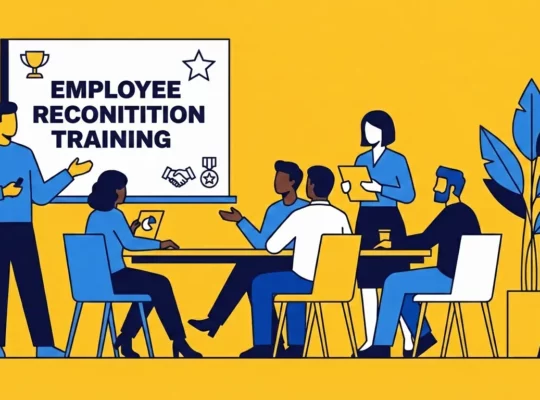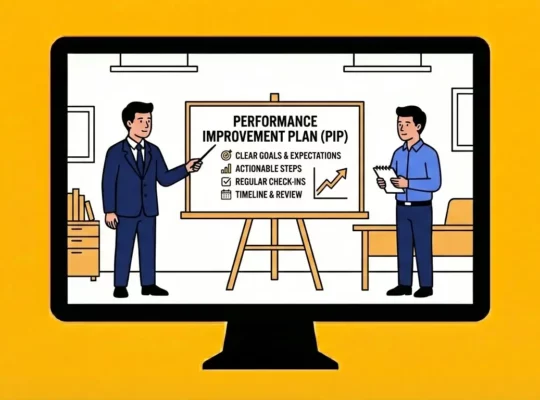Career management is a critical process for aligning employee growth with organizational goals, and a well-crafted career management plan is the key to achieving this balance. At Review.jobs, we understand the value of empowering employees while driving company success. In this guide, we’ll show you how to develop a career plan that works for both individuals and businesses.
Effective career plan: what is it?
In a company, the career plan is a tool for developing employees’ skills. Also called a development plan, this tool refers to a set of stages that draw the career path of an employee. In other words, all the employee needs to know concerning which direction to take. It is a roadmap that traces the career of an employee.
This sheet presents the potential path to follow within the company. The career plan combines two things: the company’s plan for the employee and then the employee’s plan for themselves. It is an important tool that gives a vision of the internal mobility of employees within the company.
Why develop an effective career plan?
The career plan is useful for both the company and the employee. It has many advantages aimed at professional achievement and evolution on both sides. Nevertheless, the employee remains the very first person concerned. The goal for them is not to change jobs, but rather to take a step forward in their career. Anyone can set up a career plan, regardless of the profession and at any stage in life. However, not everyone needs it.
Employee Benefits
For the employee, the career plan is a source of motivation. It is a set of objectives and actions that allow them to achieve their long-term goals. For employees, it is a force of attraction and at the same time a force of retention. They then consult a trusted platform of employee reviews to draw inspiration from the experiences of other employees.
Depending on the commitment to work demonstrated by an employee, the human resources manager can draw up a very good career plan. They will then have to be trained to acquire new skills in order to ensure their probable new tasks. This planning allows a good professional progression.
Benefits for the employer
For employers, thoughts about a likely career progression for an employee are about those who are loyal in the long run. This work is much more under the responsibility of the human resources manager. Its task is to help employees see more clearly their situation within the company. It makes it possible to anticipate to guarantee the competitiveness and development of the company.
Another advantage is that it strengthens their image and therefore attracts customers and potential employees. In addition, the company can reduce costs related to new hires by valuing internal talent and avoiding corporate turnover.
Creating a relevant and sound career plan helps meet employers’ expectations. It allows them to develop a competitive spirit and to be very active in their tasks for the good of the company.
Effective Career Plan: Key Steps to Success
The implementation of a career plan within a company must follow a number of steps. But first, let’s remember that a career plan must be smart, evolving, measurable, attainable, realistic, time-limited, and flexible.
Make an up-to-date assessment
This point is valid both for the employee and for the company, it is important to make a point of where we are. Based on this, it is much easier to know the direction to take to progress.
Personal assessment
If you are an employee, your balance sheet still called self-assessment or self-exploration consists of making the general assessment. The balance sheet concerns both your personal and professional life. You need to make a list of your interests, skills, future ambitions, and strengths and weaknesses. You must also:
- make good decisions for yourself;
- align your career goals with your educational needs;
- match your career goals with your financial needs;
- match your skills to existing jobs or careers;
- link your skills, talents, added value, or interests to potential jobs;
- Find ways to meet your educational and financial needs on your schedule.
Everyone is wondering where they will be in five ten or fifteen years. It is sometimes a puzzle that frustrates us at times. That’s why these questions all keep their value regardless of your position within the company.
Company Balance Sheet
For the company, these questions are also valid to know the level of advancement and future ambitions of the company. Professional exploration consists of:
- Search for relevant profiles or jobs;
- conducting interviews;
- defining the corresponding competencies and;
- Prioritizing skills by the standard job.
The answers obtained make it possible to establish an effective and accurate career management plan for employees.
Search for opportunities
Here, it is a question of monitoring and evaluating skills. Getting there as an employee takes a lot of focus and self-discipline. It is a question of listing all the possible areas to work. External possibilities are sometimes contingencies. The important thing is that the remuneration is advantageous. Within a company, it is up to the human resources manager to find opportunities for employees. Mobility is not advantageous for the latter.
Personal coaching and promotion
94% of employees say they would stay longer at a company if it invested in their careers. To do this, the company first makes an inventory of the lacks and weaknesses. It must ensure that the training to be offered is flexible. This will allow all beneficiaries to adapt and gain maximum knowledge.
At the end of the training, it is important to conduct a satisfaction survey and collect employee feedback about the training experience. 2 in 10 employees are dissatisfied with one or more aspects of their corporate training. These numbers are clear indicators of the necessity of regular assessments to guarantee the fruitfulness of these initiatives.
Presentation and components of a career plan
A career plan serves as a structured framework, often presented as an Excel table or a visually engaging chart, designed to outline and guide professional growth. It typically encompasses the following elements:
- Salary progression milestones: Defining the financial trajectory and compensation expectations.
- Aligned objectives: Setting clear and actionable career goals.
- Responsibility levels: Clarifying the roles and duties associated with each career stage.
- Skill requirements: Identifying the hard and soft skills needed for advancement.
- Performance metrics: Establishing KPIs to track and measure success.
- Action steps: Outlining specific strategies and initiatives to achieve goals.
Tips for a successful career plan
Every employer must learn to recognize the strengths and weaknesses of their employees. They must avoid the bad atmosphere at work by creating an effective communication environment. To be a good employer, you need to develop leadership skills in business. These rules that should not be overlooked help prevent stress at work. Realistic, long-term perspectives keep employees motivated. All competent employees must be able to benefit from a career plan to avoid conflicts between colleagues at work.
If, as an employee, you manage to get your career plan established, it is still important to have contingency plans. You will be better prepared to face the uncertainties of the professional world. Also, you must often take a step back and be flexible. By adapting to the good organization of the company, you will be able to prevent burnout which is not advantageous for the company or the employees.
A career management plan is more than just a framework—it’s a loyalty-building tool that benefits both employees and organizations. By fostering growth and stability, companies can retain top talent while employees take charge of their professional development. Let Review.jobs help you unlock the full potential of effective career management.





